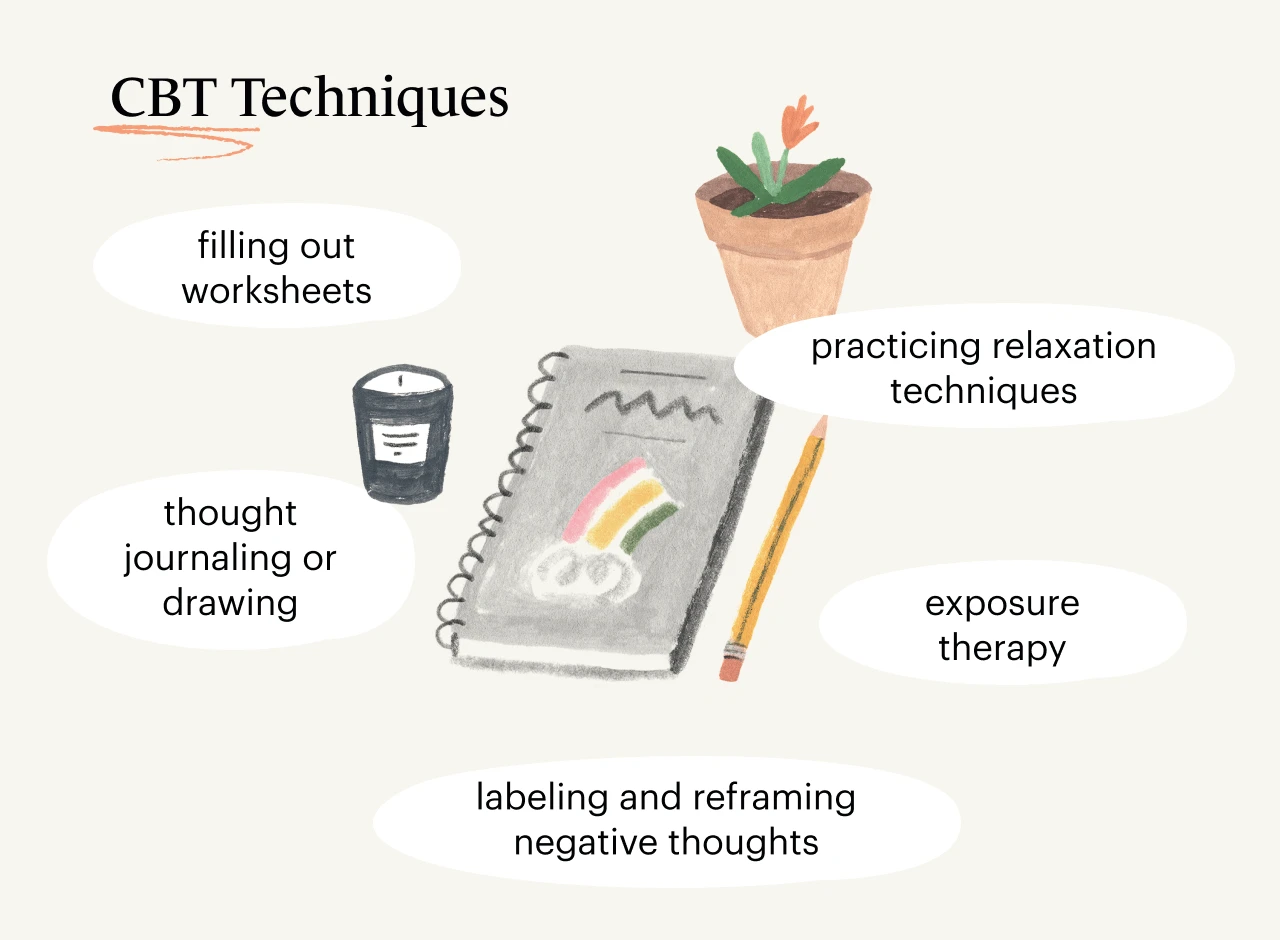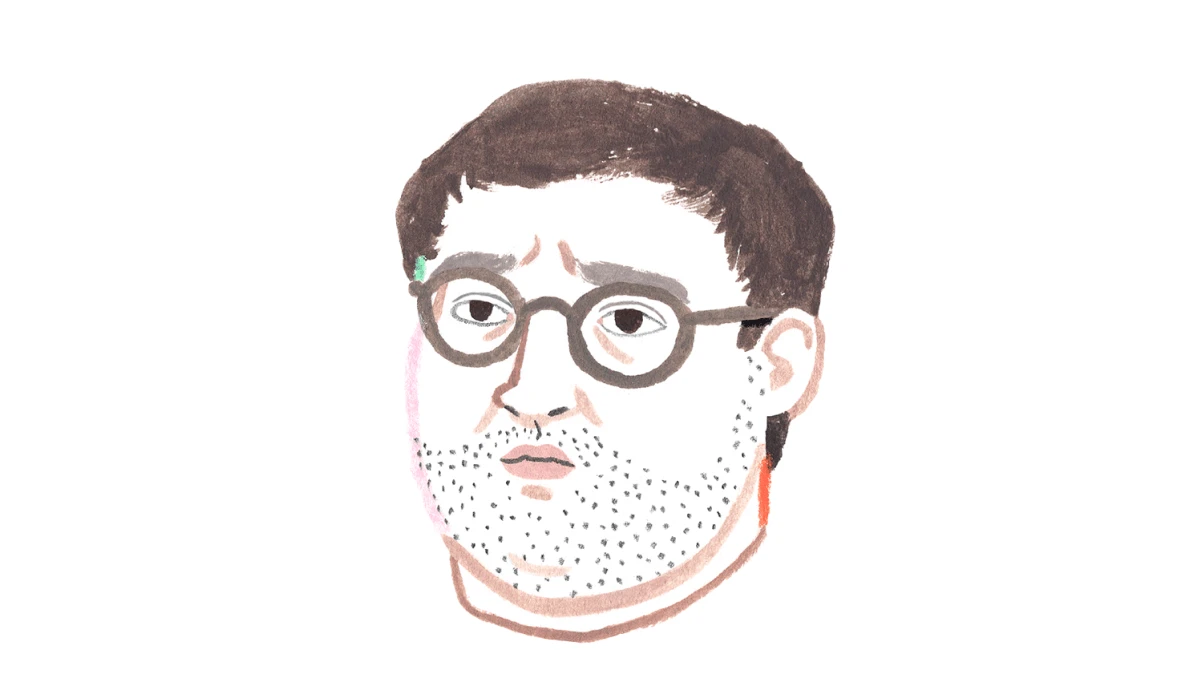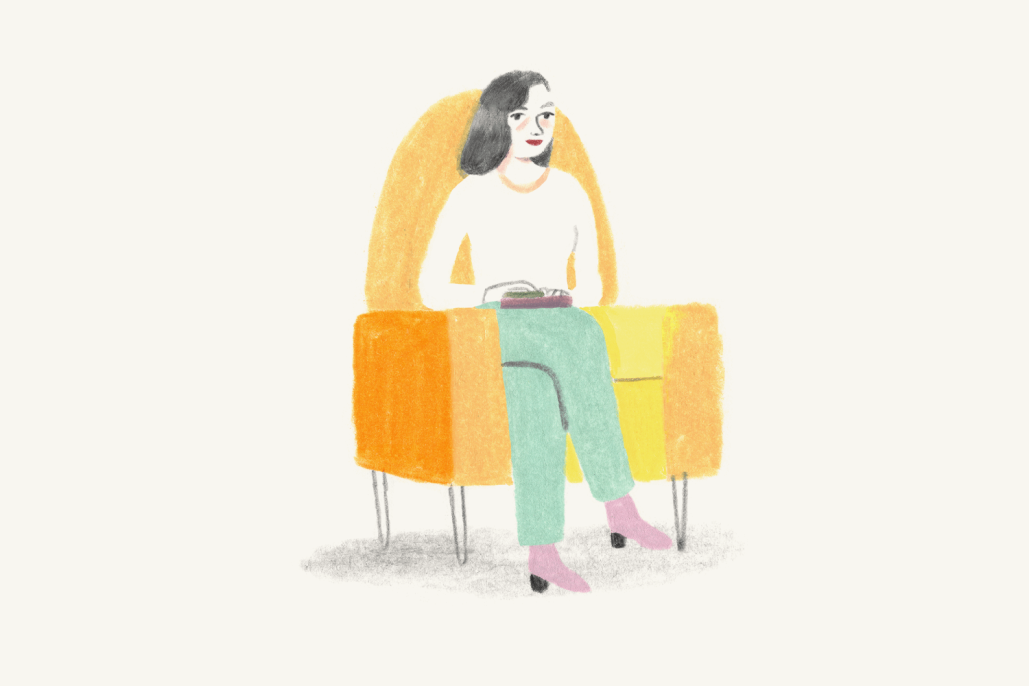Can CBT help with anxiety and depression—two of the most common mental illnesses in America?
Let’s start by taking a look at how this type of therapy works.
Described as a solution for everything from insomnia and procrastination to relationship problems and low self-worth, CBT—cognitive behavioral therapy—has become one of the increasingly popular types of psychotherapy in recent years.
Is CBT the same as psychotherapy aka talk therapy?
First things first, you may be wondering, what's cognitive behavioral therapy?
CBT is a form of psychotherapy, aka talk therapy, focused specifically on changing destructive or distorted thought patterns.
In the name "cognitive behavioral therapy," cognitive refers to the way you think, and behavioral refers to the actions you take.
CBT is a form of psychotherapy, aka talk therapy, focused specifically on changing destructive or distorted thought patterns.
The primary focus in cognitive behavioral therapy is identifying automatic negative thoughts and behaviors (aka ANTs), and replacing them with healthier, positive responses.
CBT emphasizes direct, solution-oriented interventions that result in measurable changes.
What’s the difference between CBT and talk therapy?
“The biggest difference between CBT and traditional talk therapy is that traditional psychotherapy is very past-oriented,” says therapist Marie Ritz, LCSW.
“In talk therapy, you will share more about your childhood and how it has affected you—whereas CBT is present-oriented,” she explains.
According to Ritz, in CBT therapy you will identify negative thinking patterns, do self-monitoring, and learn healthy coping skills to deal with difficult emotional states.
“In talk therapy, you will share more about your childhood and how it has affected you—whereas CBT is present-oriented.”
“Some therapists specialize in CBT only, while others trained in psychodynamic theory practice both modalities simultaneously,” Ritz says. “Treatment depends on the individual’s needs and presenting problems.”
6 ways cognitive behavioral therapy differs from traditional psychotherapy
These are some key differences about CBT, as compared to traditional talk therapy:
CBT is present-oriented, rather than focusing on the past, as is common in more traditional psychotherapy, as Ritz mentions above.
CBT is short-term and can be completed in less time compared to other types of talk therapy—typically 8-12 sessions
Patients need to come to the CBT therapist with a specific goal
The CBT therapist works with the patient to create an action plan
CBT training is often provided in a group setting
In CBT therapy, clients are required to spend time on CBT homework outside of therapy sessions—they’re typically assigned at-home assignments to complete CBT worksheets.
Did someone say homework?
Reducing or managing symptoms and developing healthy coping skills to deal with difficult emotional states often requires patients to apply therapeutic techniques in their day-to-day lives.
For CBT therapy these at-home assignments or homework might include:
Filling out CBT worksheets
Thought journaling or drawing
Labeling and reframing automatic negative thoughts (ANTs)
Exposure therapy
Practicing relaxation techniques

Can CBT cure anxiety?
Cognitive behavioral therapy is the most widely used therapy for anxiety disorders, considered the gold standard in treating anxiety for the past 20 years based on research.
Studies have shown CBT to be highly effective in reducing anxious thought patterns.
A large body of empirical evidence has demonstrated that CBT is a successful method to treat generalized anxiety disorder (GAD), panic disorders, phobias, social anxiety, and PTSD.
Studies have shown CBT to be highly effective in reducing anxious thought patterns.
When practicing and using CBT skills, patients can interrupt worrying, stop rumination on negative outcomes, consequently, replacing negative thoughts with positive thoughts.
“[In CBT therapy] you might name your anxiety, anthropomorphize it, and think of it as something outside of you,” says Ritz.
For anxiety disorders such as obsessive compulsive disorder (OCD), a CBT component called exposure therapy can get measurable results.
Exposure therapy teaches individuals to face their fears in a structured, step-by-step process.
Through the process of exposure therapy, patients are introduced to things or situations that trigger their anxiety, in a controlled setting, for longer and longer periods over time until, eventually, the issue is largely overcome or significantly diminished.
How does CBT help depression?
For those of us who suffer from depression and major depressive disorder (MDD), taking action can seem impossible and even pointless.
A 2020 study concluded there are many advantages to CBT in treating depression. CBT has been shown to measurably address the low mood, hopelessness, and lack of activity that characterize people suffering from depression and mood disorders.
CBT therapists teach patients how to how to identify automatic negative thoughts (ANTs) that lead to depression and provide tools to cope with distorted thinking.
Therapists guide patients to break down seemingly overwhelming problems into smaller more manageable parts so they can be reframed in a positive way.
This can help break the painful cycle of inactivity and isolation.
“We help patients to notice the negative self-talk, test the evidence, and let go of the harmful thoughts—this lessens their despair."
“Part of CBT is about your thoughts in the present in the here and now, but it’s also about identifying your core beliefs about yourself,” says therapist Alan Dybner, LMFT.
“We help patients to notice the negative self-talk, test the evidence, and let go of the harmful thoughts—this lessens their despair," he explains.
A patient shares her experience with cognitive behavioral therapy
Allison R.* describes going to cognitive behavioral therapy to help address her debilitating stage fright.
To get a better picture of how truly debilitating Allison’s stage fright was before she tried CBT, when she completed high school, she skipped actually attending her graduation ceremony, because she was too anxious about the idea of sitting on a football field with 500 other students in front of an audience.
“At the time I started CBT, my boyfriend was a musician, and I really wanted to perform on stage with him—that was my immediate motivation,” she says.
CBT gave Allison the tools she needed to help retrain her thought processes so that she could go beyond understanding the why.
“I’d done years of talk therapy prior to doing CBT, so I had a good idea of the underlying causes of my anxiety, however I didn’t have solutions to help me with the practical aspects of managing it,” she explains.
According to Allison, CBT gave her the tools she needed to help retrain her thought processes so that she could go beyond understanding the why.
”[With CBT] I was able to take real concrete steps toward changing how I responded to the situations that caused my anxiety,” she says, pointing out that she appreciated how structured CBT is in comparison to psychotherapy.
“Also with CBT I had an end goal that I was working toward, unlike with talk therapy where the goal can seem more subjective,” she explains.
After CBT, Allison says she was able to sing and play keyboard at many live shows.
Today, years after doing CBT therapy, Allison tells us she still uses the skills she learned in CBT throughout her professional life at work as well.
And—most importantly—she enjoyed performing.
“At my first show, I mentioned to an audience member that I’d never performed for an audience before, and they were shocked!” she says. “They told me I seemed really confident.”
Today, years after doing CBT therapy, Allison tells us she still uses the skills she learned in CBT throughout her professional life at work as well.
“I also am much more able to engage in presentations at work without absolute terror,” she explains. “It’s not that I have zero anxiety— but it’s reasonable, and I now know how to manage it.”

Is CBT better than traditional psychotherapy?
Both CBT and traditional psychotherapy (aka talk therapy) can be beneficial—depending on the individual and their specific concerns.
“If you are addressing trauma and old wounds, psychotherapy is better,” says Ritz.
Talk therapy allows patients to explore the deep roots of why they have certain thoughts or feelings. During talk therapy sessions, the counselor or psychotherapist will provide a safe space to process childhood memories, dreams, and relationships.
In comparison, a CBT therapist will challenge a patient’s beliefs in the present that no longer serve, and provide concrete tools to overcome them.
During CBT sessions, the patient must play an active role in therapy—committing to doing work outside of session.
CBT and talk therapy can work very well together.
In fact, many therapists, including Monarch’s Expert Reviewer Ellen Biros, MS, LCSW, regularly combine both methodologies to best serve their patients.
"I use a combination of CBT and psychotherapy to help my clients understand experiences from their past (psychotherapy) and develop specific skills to cope with their thoughts and feelings in the here and now (CBT)," says Biros.
Is CBT right for you?
Therapist Eve Sturges MA, LMFT, suggests patients ask themselves this question: “How deep do you want to go emotionally to feel better?”
Additionally, Sturges encourages clients to think about whether or not they can commit to the concept of completing homework outside of their therapy sessions.
CBT may not be the right choice for all patients.
According to Biros, there can be many roots to anxiety and depression including, family history, lifestyle, brain structure, economics and trauma.
Biros says delving into a patient's past may help to uncover and address the root of their anxiety and depression or other mood disorder, making the treatment process more effective.
Find a therapist who specializes in CBT or talk therapy to treat anxiety and depression
The Monarch Directory by SimplePractice can help you to find a licensed therapist who specializes in CBT as a therapeutic approach for anxiety and for all types of depression.
If you’re not sure whether you want to try CBT and you’re curious about regular talk therapy, you can also check out Monarch to view therapists near you who treat anxiety using other modalities such as talk therapy, as well as therapists experienced with treating depression.
You can quickly and easily view their availability and book a therapy session. Many offer free 15-minute initial consultations and in-person or teletherapy video sessions.
If you have health insurance coverage, you can also browse therapists who accept your insurance.
Do I have an anxiety disorder?
Take our 2-minute online anxiety assessment to find out whether you may have the symptoms and signs of an anxiety disorder.
Simply answer a few quick questions, and you'll receive completely confidential personalized results.
The quiz was developed based on the GAD-7, a widely used tool to screen clients with anxiety symptoms. Your results from the quiz should not be viewed as a replacement for professional treatment.
Wondering if you're depressed? Take our online depression assessment
If you’re concerned you might be depressed, take our online depression assessment to receive immediate feedback about whether you may be experiencing a depressive disorder.
It's fast, free, confidential, and clinically validated.
* Allison R.’s name is changed to protect her privacy and confidentiality.
READ NEXT: What’s Causing My Anxiety, and Will It Ever Go Away?
Need to find a therapist near you? Check out the Monarch Directory by SimplePractice to find licensed mental health therapists with availability and online booking.





